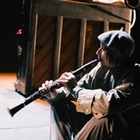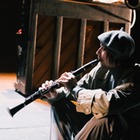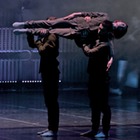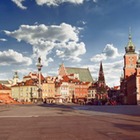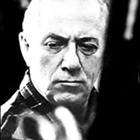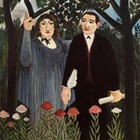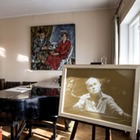Studio for New Music Ensemble
Nikita Agafonov, Evgeniy Barkhatov, clarinets
Vladimir Ustyantsev, saxophone
Ekateriva Fomitskaya, violin
Mona Khaba, Natalia Cherkasova, piano
Performers:
Composer - Georges Aperghis
Instrumental theatre builds a particular kind of stage behavior and a special mode of communication to the audience. The musicians not only play their instruments they also act as drama artists: they move along the stage, recite text, sing, read etc. The genre of music theatre is thus a truly interdisciplinary form of art and the music here is both to listen and to see.
Georges Aperghis, Greek-French composer, awarded Golden Lion for lifetime achievement at the Biennale di Venezia composed Little Red Riding Hood (Le petit chaperon rouge) in 2001. Based on Charles Perrault’s tale the work builds a score for six performers who present the story full of scenic and music effects, unexpected storyline turns. The work has been designed for children as well as for adults – the flow of the peerless but ambiguous narrative invites everyone to take an active part in the performance and allows for new impressions on contemporary music language.
The Studio for New Music ensemble was the first group in Russia to explore the genre of music theatre with its production of Der Stand der Dinge by Faradzh Karaev in 2016 followed by staged works of Kagel and Aperghis.
Alexei Smirnov – stage director
Graduated from Russian Academy of Theatre, awarded prizes at the Mariinsky Theatre Competition, Novosibirsk Opera and Ballet Theatre “Nano-Opera” Prize.
Elena Bodrova – stage designer
Vladimir Tarnopolski – artistic director
Performers:
Studio for New Music Ensemble
Nikita Agafonov, Evgeniy Barkhatov, clarinets
Vladimir Ustyantsev, saxophone
Ekateriva Fomitskaya, violin
Mona Khaba, Natalia Cherkasova, piano
Composer - Georges Aperghis
Instrumental theatre builds a particular kind of stage behavior and a special mode of communication to the audience. The musicians not only play their instruments they also act as drama artists: they move along the stage, recite text, sing, read etc. The genre of music theatre is thus a truly interdisciplinary form of art and the music here is both to listen and to see.
Georges Aperghis, Greek-French composer, awarded Golden Lion for lifetime achievement at the Biennale di Venezia composed Little Red Riding Hood (Le petit chaperon rouge) in 2001. Based on Charles Perrault’s tale the work builds a score for six performers who present the story full of scenic and music effects, unexpected storyline turns. The work has been designed for children as well as for adults – the flow of the peerless but ambiguous narrative invites everyone to take an active part in the performance and allows for new impressions on contemporary music language.
The Studio for New Music ensemble was the first group in Russia to explore the genre of music theatre with its production of Der Stand der Dinge by Faradzh Karaev in 2016 followed by staged works of Kagel and Aperghis.
Alexei Smirnov – stage director
Graduated from Russian Academy of Theatre, awarded prizes at the Mariinsky Theatre Competition, Novosibirsk Opera and Ballet Theatre “Nano-Opera” Prize.
Elena Bodrova – stage designer
Vladimir Tarnopolski – artistic director
Performers:
The Theatre Ballet Moscow
Studio for New Music Ensemble
Conductor - Philipp Chizhevsky
Composer: Andrey Kuligin
Choreographers of performance: Anastasia Kadruleva and Artem Ignatiev
Production designer and costume designer: Sergey Illarionov
Lighting designer: Lyubov Svobodova
From Aristotle to Lessing, from Gramsci and Adorno to Deleuze and Levinas - there has always been a discussion about intrinsic values of the art forms: whether the arts exist as self-reliant phenomena or they all have common roots and do need each other. At first sight, the art of music is perhaps the only self-sufficient form of art. That’s why it has certain power to influence our perception of other arts as a background process or else by highlighting elements of the other arts or by opening up yet another facets of a piece of art. Together with Vladimir Tarnopolski and Fedor Sofronov the listener is invited to this journey though the different art forms and to take part in the controversial discussion between music and other arts.

